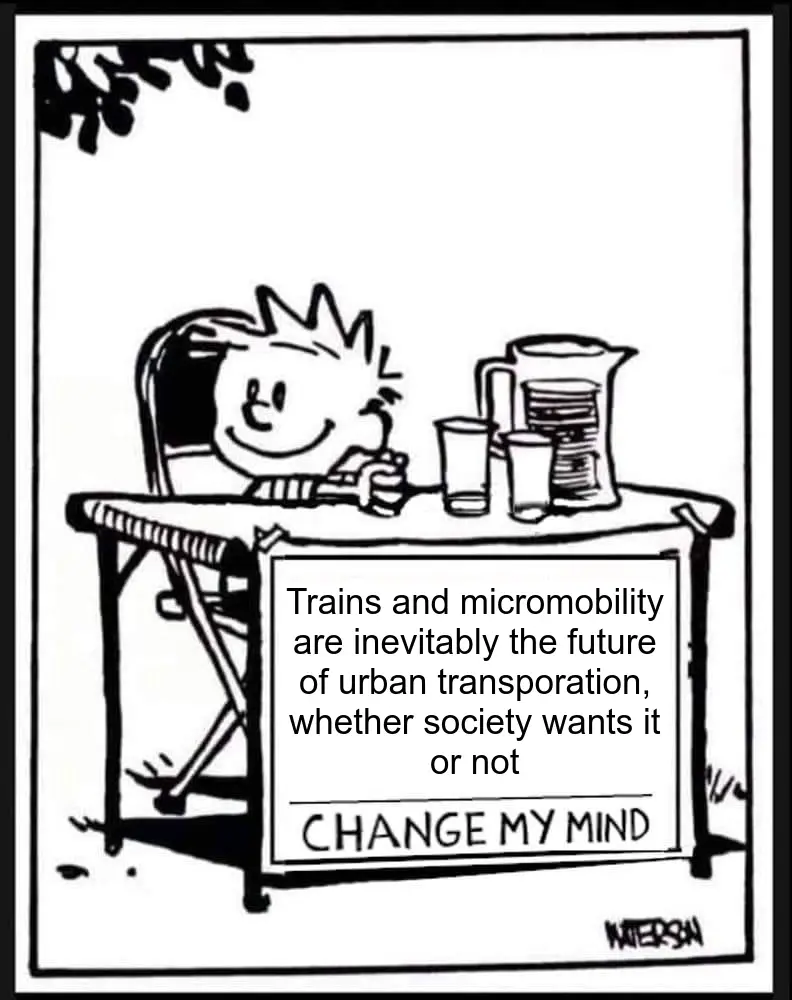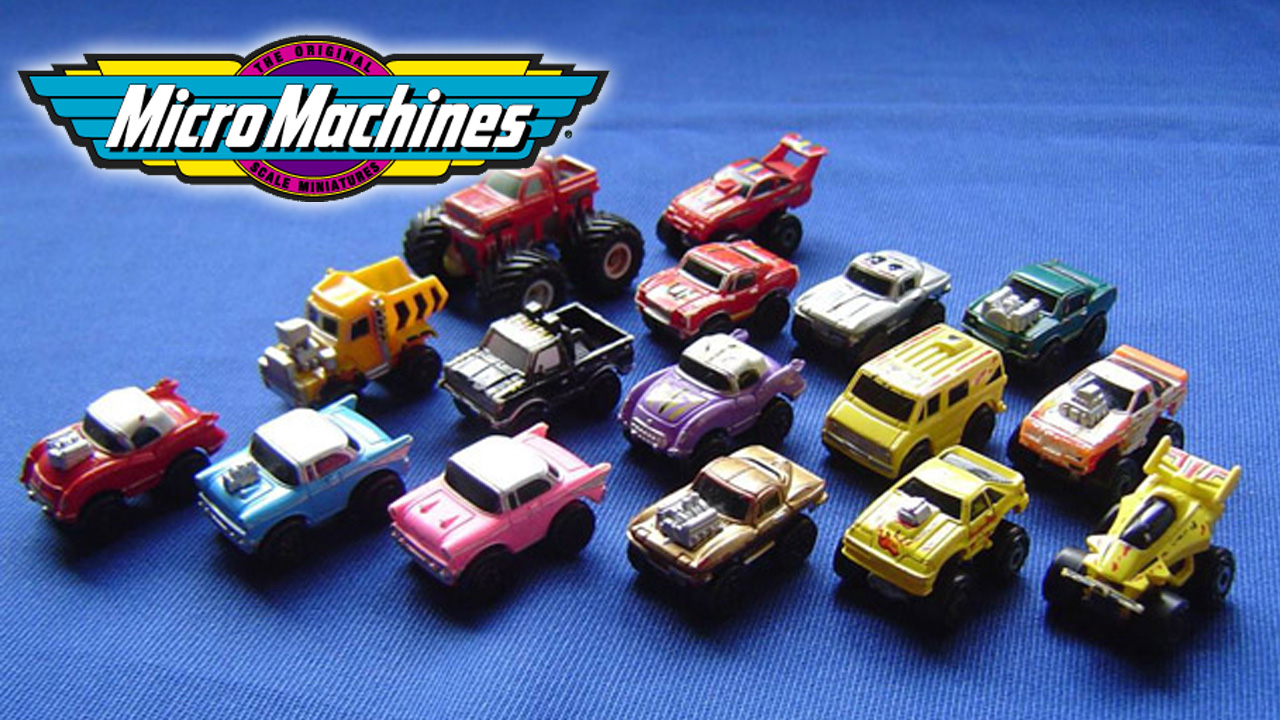I like how you assume that society will choose to have a future over self-immolation.
Fuck Cars
A place to discuss problems of car centric infrastructure or how it hurts us all. Let's explore the bad world of Cars!
Rules
1. Be Civil
You may not agree on ideas, but please do not be needlessly rude or insulting to other people in this community.
2. No hate speech
Don't discriminate or disparage people on the basis of sex, gender, race, ethnicity, nationality, religion, or sexuality.
3. Don't harass people
Don't follow people you disagree with into multiple threads or into PMs to insult, disparage, or otherwise attack them. And certainly don't doxx any non-public figures.
4. Stay on topic
This community is about cars, their externalities in society, car-dependency, and solutions to these.
5. No reposts
Do not repost content that has already been posted in this community.
Moderator discretion will be used to judge reports with regard to the above rules.
Posting Guidelines
In the absence of a flair system on lemmy yet, let’s try to make it easier to scan through posts by type in here by using tags:
- [meta] for discussions/suggestions about this community itself
- [article] for news articles
- [blog] for any blog-style content
- [video] for video resources
- [academic] for academic studies and sources
- [discussion] for text post questions, rants, and/or discussions
- [meme] for memes
- [image] for any non-meme images
- [misc] for anything that doesn’t fall cleanly into any of the other categories
Recommended communities:
Yeah that's a bold assumption. My bet is on "it's going to get progressively worse and never better". I have yet to be proven wrong. Since the day I was born everything's been enshittening with only inconsequential cosmetic improvements (lol technology, what a joke).
If nothing else, car dependency is fiscally unsustainable. We might go kicking and screaming towards the solution, but eventually people will have no choice but to abandon the financial suicide that is making your city car dependent.
True, and I wish my city would realize it harder, sooner. On the other hand, I just read an article the other day that claims that the collapse of civilization has begun. A lot of societies throughout history perseverated with maladaptive habits after the local environment changed, and thus collapsed. A lot of them didn’t, though, and I hope that we’ll wise up in time.
!collapse@lemmy.ml
But yeah, honestly, I'm worried myself that our society is starting to unravel if we don't get our act together. Unmitigated climate catastrophe may well prove to be the greatest disaster in human history, if you count all the wars, famines, genocide it may cause. I sincerely hope it doesn't turn out so dire, but so far humanity is stubbornly refusing to do anywhere near enough to stop it. Whether that's civilization-ending or merely really frickin bad remains to be seen, but it's also worthwhile noting that collapse doesn't always mean post-apocalyptic; for farmers in ancient Rome around its collapse, life probably didn't seem all that different day-to-day.
I especially like that this format of the meme removes the d-bag that is in the original.
What is micromobility? I am unfamiliar with this term.
Hi there! Looks like you linked to a Lemmy community using a URL instead of its name, which doesn't work well for people on different instances. Try fixing it like this: !micromobility@lemmy.world
We shouldn't take anything for granted. The US has happily killed it's cities for decades instead of investing in public transit. If we don't push for it, car companies and rich people will keep public transportation from ever taking off.
If remote work takes off, and ordering most everything online, I wonder if urban sprawl will get even worse.
The more people try to "innovate" transportation the closer it gets to going back to trains. Driverless cars, for efficiency have them communicate with eachother, to accelerate and brake at the same time, for example. That's just less efficient and more expensive trains.
There's a massive failure condition for your example - sure, autonomous cars behave like trains when they communicate with each other to sync acceleration and deceleration, but they can also separate themselves from the collective to drive you to the door of your home. In the train metaphor this would be like you sitting in your own train car, and the train car separating from the rest of it and driving you to your doorstep.
Good job with meme template, everyone needs to start adopting this format and not the one with the conservative fascist chud that abuses his wife.
I'm going to make the argument against trains for everything, despite being a huge fanatic for trains.
Trains are the most efficient transport method per tonne-km over land, yes. However from certain operational standpoints trains can make less sense than existing solutions.
When distance between stops for heavy rail becomes too short, you lose quite a bit of efficiency. Trains themselves aren't a one-size fits all solution as there are various types that each need their own form of investment (which is a lot $), when roads are compatible with both personal transport and large trucks with little investment by the transporter (govt pays for road maintenance).
Rail companies right now are chasing profits and neglecting operational improvements. In the US, hauling a long, LONG, old and slow train loaded with bulk aggregate, oil, grain, chemicals is more profitable than aiming for JIT capability that is more feasible with trucks. A complete change in societal incentives is necessary to bring back the usefulness of railway in all types of transport. Second, the North American way of railroad companies owning the tracks dissuades a lot of innovation and new firms from entering the market, unlike the "open road" where there are many competing OTR freight companies. None of the Big Six would like my idea of a nationally controlled rail/track system.
The future of transportation is no transportation.
How many car miles could be saved each year if people didn't have to go to the office to do their jobs? We were already most of the way there.
That... is silly. Things need to move.
So you expect us to live in a virtual pod with a treadmill and grow all of our own food? And collect rainwater?
Edit: I’m not saying we shouldn’t reduce our need for freight. Growing food in your backyard (half of my yard is good production) reduces the need for freight emissions. And I cycle to work. But drive or fly on holidays, I wish we had a more reliable train network.
Not everyone works in an office. Construction, trades, and utility works still need vehicles to work on and create infrastructure out and indoors.
You'll also have tons of people in rural area like farmers and ranchers that still need vehicles.
That being said most of those vehicles will be electric soon. My company will be moving to electric starting in 3 years.
PS: I'm a utility worker, and we take our work vehicles home foe weather emergencies, so the transportation line is a little blurred for me
Yeah, you still need to transport items, and people that do things with their hands, but surely in most first world countries, these things are a minority of road traffic.
If you can get those chokepoints out the way, from dystopian 10 lane traffic jams to an overcrowded tube train, everything else would run so much smoother.
mfs in 1923: "Cars will never replace trains and horses because there's whole swaths of the country with no highways or gas stations!"
I agree. I just wanted to say that I really hope this meme completely replaces the original one, so we won't have to look at Steven Crowder's face as much going forward.
The suburbs are inherently compatible with trains and really any public transportation. They were quite literally designed around the car and the expectation that everyone would have a car.
Unless you plan to bulldoze the suburbs and then force everyone to move into higher density areas your anti-car dreams are never going to happen.
Although there are many American cities that could get much more anti-car and public transport would work. LA could theoretically not be such a car city with the appropriate infrastructure built in.
Why are the anti-car people anti-self-driving car? With self-driving cars we could mostly eliminate private car ownership.
inevitability the future of urban transportation
I don't know, I think you're forgetting the possibility of us all just dying.
Nope.
Those super long electric busses will become more popular than trains. They are muuch cheaper to get. You can just send in a new one in case the first one breaks down, etc.
Though we also cant all live nrar these "train stops"?
I dont live near any right now.
Trains can transport higher loads of people though. So ultimately both trains and busses need to be the priority.
100% depends on where you're going and how far journeys are.
For a small inner city area, a subway is great. For a larger urban area, a tram system. For intercity travel, trains. Out in a rural area, buses would be the way, although more remote locations would need government subsidies to be even remotely functional, and even then it may resemble on demand taxis rather than a scheduled bus service.
No single solution will get you all the way there.
I don't disagree but there are two points that spring to mind.
- This is an inevitable future, but I think it's very far off. In order to make this viable towns and cities would need to be radically different.
- How would large item courier services operate after that modification?
A huge problem with public transportation is safety and usability for small children, the elderly, and people with disabilities or who are sick. All these people often can't use bikes or scooters. They have problems with having to wait standing and constantly out of order escalators and elevators.
I don't own a car and live in a place with relatively good public transportation. That's the biggest problem I see, next to how badly organised it is (at least here in Germany).
One of the leading causes of death for children in North America is from cars. Well funded and built transit should be accessible to all in their urban areas. Stops should have sheltered waiting areas with adequate and maintained seating. Good maintanence and funding would reduce equipment failures in elevators and other equipment. Ideally we densify around this transit as well which would help to reduce travel distances for people with movement disabilties and promote walkability. 95% of the time well designed and funded transit paired with good urban density and zoning will be more accessible to those with disabilities than private vehicle ownership.
That is an organizational problem because my country next to it has all those things at just about every train stop (Switzerland).
Elderly people use electric mobility scooters at Disney literally all the time. They're pretty great for the elderly so long as there's accessability ramps everywhere.
Escalators and elevators being out of service seems like an issue of lack of investment in public transit.
And cities can be built around public transit and micromobility while still allowing cars. Generally, you'll have better access for emergency vehicles, and you can do the same for people with disabilities.
Can we get light rail and trams in there?
The focus urban transportation is a good one imo


